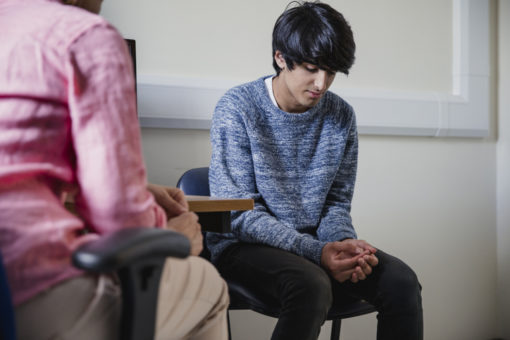Depression is more than just a sad or irritable mood. This mood disorder affects a teenager’s daily functioning and can negatively affect their school performance and relationships. Depression is characterized by difficulties with sleep, changes in appetite, poor concentration, low energy, sad mood, loss of interest in activities, feelings of guilt, and suicidal ideation. Teenagers may exhibit aggressive behavior, social withdrawal, a decline in academic performance, a drastic change in their peer group and even rebellious behavior that is out of the ordinary. Talking to your teen when you feel like your teen is exhibiting some signs of depression is vital.
Talk to Your Teen about Common Myths about Depression
Most teenagers have likely heard derogatory and untrue things about individuals struggling with a mental illness. The older a teenager grows, the more likely they are familiar with the social stigma surrounding mental illness and addressing these inaccuracies is vital for teenagers to understand the importance of mental illness and that it is a disease, not a choice.
Encourage Supportive Relationships
Depression can cause a teenager to go into isolation and withdrawal from his/her friends. Encourage your teenager to continue to engage with positive, supportive relationships because staying connected in a community can help teenagers and adults through some of their darkest days.
Explain the Meaning of Treatment for Depression
Educating your teenager about depression is crucial for them to fully understand what treatment can do for this mood disorder and how necessary treatment is. Sometimes teenagers do not want to go through treatment because they are uninformed and scared. Remind them that treatment is just not about taking medications but also about being fully present in therapy sessions and working on life skills daily.
Actively Listen to Your Teenager and Validate Their feelings
It is vital that your teenager recognizes that you are hearing and understanding what he/she is telling you is incredibly important. You can practice active listening by using body language that shows you are paying attention, occasionally summarizing your teenager’s concerns and asking questions to clarify points.
Agree on a Depression Treatment Plan that Works for Both of You
Agreeing on a treatment plan means that you and your teenager are more likely to engage in treatment and follow through homework, therapy sessions, and support groups. A teen is more likely to develop a plan if they helped make it. Not only because it is more likely to meet their needs if they participated, but also because they own it and it is theirs.
Be a Safe Place for Your Teenager
As a parent, you are your teenager’s confidant. Make sure that your teenagers know you are there for them no matter what. You should be the safe place they come home to after trying something new or after having a stressful day.
Treatment for Depression in Teens
- Antidepressants, specifically selective serotonin reuptake inhibitors, are known as the first-line treatment for depression in adults and teens. This class of medication has a risk of suicidal thoughts in teens, and therefore careful monitoring of these medications and side effects is strongly recommended. Fluoxetine (Prozac) and escitalopram (Lexapro) are two commonly prescribed antidepressants that are approved by the Food and Drug Administration (FDA) for use in teenagers to treat depression.
- Cognitive behavioral therapy (CBT): Identifies the negative thoughts, feelings and distorted emotions associated with depression and uses behavioral techniques to transform these negative thoughts into positive outlooks and positive actions. Behavioral techniques include self-control therapy, problem-solving and social skill training.
- Dialectical behavior therapy (DBT): Similar to cognitive-behavioral therapy but also includes mindfulness and stress reduction techniques.
- Interpersonal therapy (IPT): Works to recognize the inner conflicts within oneself. Identifies conflict within personal relationships and inner feelings associated with self-esteem. Techniques that involve building relationships, learning coping mechanisms, and developing conflict resolution skills can help diminish these triggers and form real insight into future conflicts.
If the teenager in your life is struggling with depression and you need help, Discovery Mood & Anxiety Program is here to help and find the right treatment.
